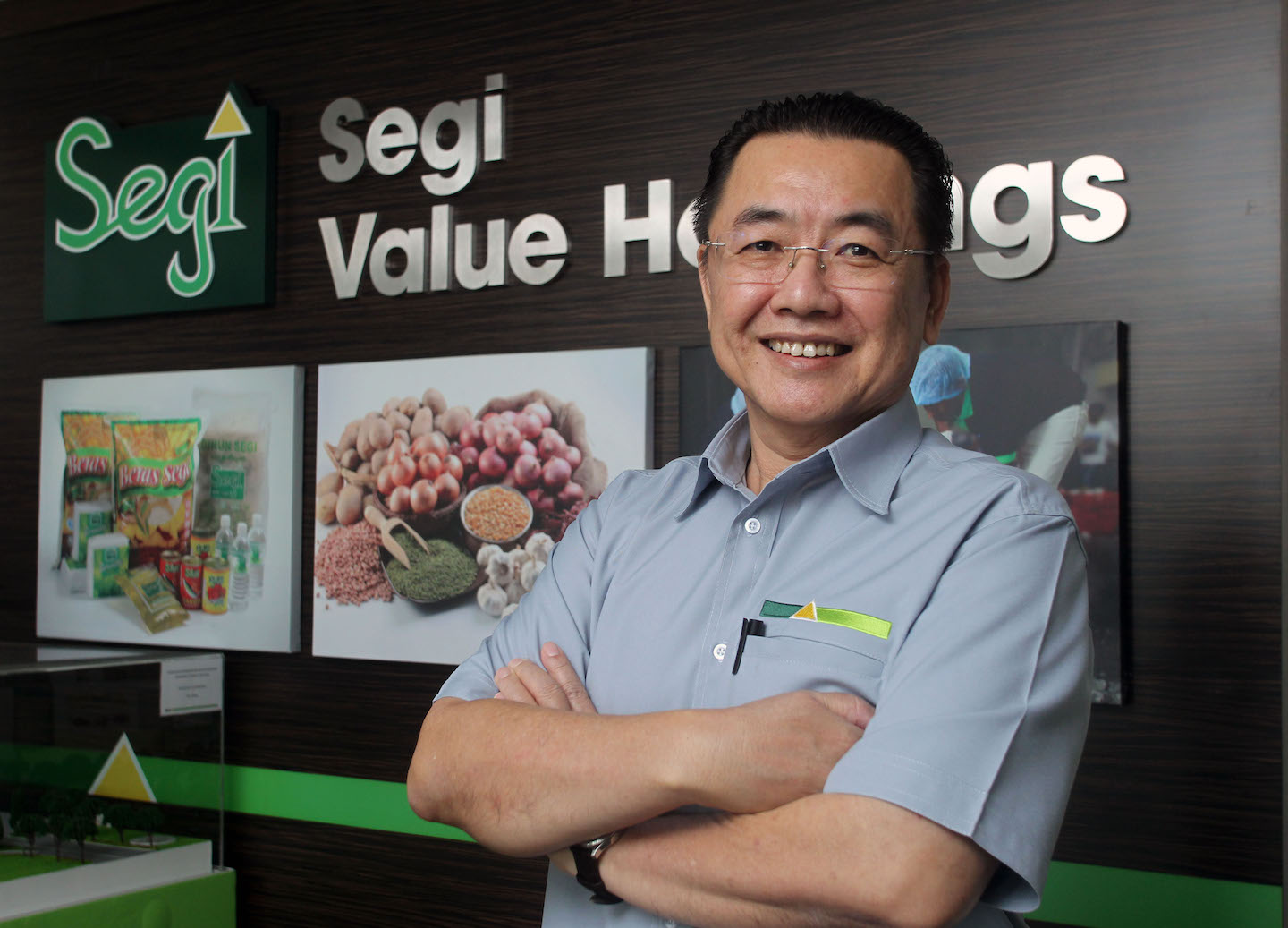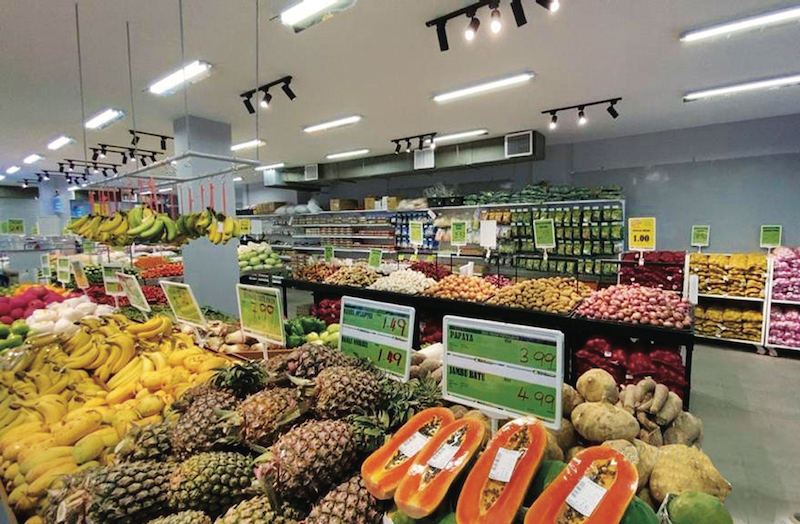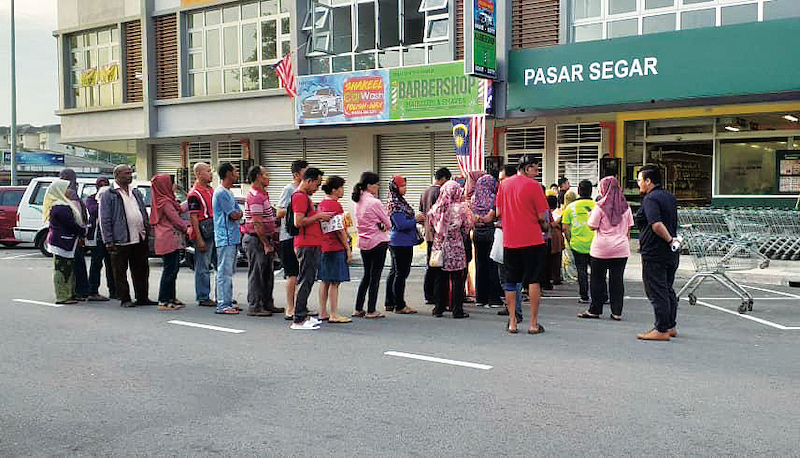
Founder and managing director of Segi Value Holdings, Meng Chui (Photo: Kenny Yap/The Edge Malaysia)
At an age when many of his peers were mucking about or getting up to mischief, Meng Chui was putting in full shifts at a pasar malam seven days a week. The 16-year-old would buy dried chillies, onions, garlic, potatoes and spices from a wholesaler across the road from his house and set up shop at the popular night market, growing a loyal customer base with his attractive pricing and product quality.
By then, the son of a lorry driver father and general worker mother was certain that school was not for him. He had completed his primary education but between that and his venture into trading, he had tried out almost 30 different odd jobs. It was turning 16 that compelled him to settle down, so to speak, and pick a path. Decades of unrelenting hard work later, the enterprising Chui is opening the 50th outlet of Segi Fresh, a chain of supermarkets under Segi Value Holdings.
“My youth is the hardest subject to talk about — I started trading so long ago, in 1984, and I can’t remember most of it,” laughs the founder and managing director of Segi Value. “What I do recall is knowing for certain that I was better suited for working life than school, and that I wasn’t good at working for other people. I knew I had to become a businessman. I had no ambitions as a child but I saw how well the wholesaler in my neighbourhood was doing and decided to try something. I borrowed RM2,000 from my brother, which was just enough to buy a bicycle cart and limited inventory, and began operating a stall at the night market near my house.”
Failing early and often
Going into a business, however humble, with no experience or knowledge, takes gumption, not only to get it off the ground but to also roll with the punches and take the hits. Chui is the first to admit he was rather naïve at the time and woefully unprepared to handle the financial aspect of the business.
“I learnt a lot about customer service then, about being reliable and meeting their [customers’] needs with good-quality items and low prices. But I knew nothing about managing my finances and quickly ran into cash flow issues,” he recalls. “I made so many mistakes but the good thing was, I was always willing to work hard. I learnt the value of that early on. Most of the other vendors would work three or four days a week, but I was there every single night with my girlfriend. We worked tirelessly, without time off.
“Of course, it was not easy but it never occurred to me to give up,” he continues. “I was strongly driven by passion for the work — I enjoyed owning my own business — and a determination to succeed. I wanted to become a very successful businessman and that required consistent hard work. My background is not the best, but I wanted to make sure my future wife and children had a good life, so I kept at it.”
The said girlfriend is now his wife and mother of their three children. After working by his side for years, she decided to focus on raising their young family while he concentrated on expanding the business into a veritable empire.
whatsapp_image_2021-01-09_at_09.50.40.jpeg

“We had been at the night market for a decade when opportunity arose,” says Chui. “Pasar Borong Selayang opened and there was an available lot that I wanted to move into. It was around this time that we decided to start a family, so many things were happening concurrently. The failures continued to hit, but I made one good decision, in hindsight.”
About three years into running the traditional market-wholesaler enterprise, known as Segi Pemborong and Peruncit, he predicted that the arrangement could not continue, and not because he was a one-man-show handling everything from sourcing and ordering to selling, servicing and deliveries.
“At the time, Malaysia was one of the biggest importers of onions and potatoes in the region. I was bringing in a huge volume of these through suppliers but I foresaw that this could not continue,” he explains. “Thanks to ‘Mr Google’, my customers found out who my suppliers were and my suppliers knew who my customers were. The circumstances were such that I knew it would be hard for me, the middleman, to survive in that market.”
Some two decades before “pivot” became the Association of National Advertisers’ 2020 Marketing Word of the Year, Chui attempted to do just that. He quickly changed his business model to one of wholesale and retail, selling directly to the end-users or customers instead of going through retailers — this time, it was he who was cutting out the middleman. This became the cornerstone of the Segi Group of companies, held under Segi Value Holdings, that operate an end-to-end grocery supply chain network.
The transition did not go as smoothly as he might have hoped — he and his staff lacked retail operations know-how and again ran into severe cash flow troubles — but the company today stands proud and is halfway to realising Chui’s ambition of operating 100 stores by 2022.
Expansion plans
The Segi Group is best known among the general public for its Segi Fresh supermarkets, but the group actually consists of five business units that cumulatively give it full control over sourcing, logistics and retail. Segi Agriculture Sdn Bhd and Segi Marine Sdn Bhd source for fresh produce, and seafood and meat respectively, Segi Cash & Carry Sdn Bhd operates the supermarkets, Segi Logistics Sdn Bhd manages its extensive distribution and transportation network and Segi Realty Sdn Bhd is in charge of store location sourcing and maintenance. Yes, the company even has its own property arm. In fact, the brand-new store — a 30,000 sq ft wonderland of affordable essentials in Pandamaran, Klang — is located on land owned by the group that used to host its wholesale warehouse.
While Segi Fresh is not yet a nationwide name, with outlets centred in Selangor, Kuala Lumpur, Putrajaya, Negeri Sembilan, Melaka and Perak, it is only a matter of time before it expands further north and south. Competition is rife but the supermarket chain has a stronghold in the markets within which it operates due to the observations Chui made when he was a night market trader.
Quality and affordability were key in pushing the brand to prominence. By establishing direct relationships with manufacturers, farmers and fishermen, Chui was able to bring in groceries and the freshest fruit, vegetables, meat and seafood at low prices, transferring that cost savings to customers. In the early years, Segi Fresh was positioned as a concept store, bringing that pasar malam energy into cleaner and cooler environments with all-day operating hours. Customers could even haggle over prices of the fresh produce but the practice was phased out recently as acquiring total control over the supply chain allowed the group to offer the best value.
“Bargaining is no longer relevant to us. It used to be a mechanism to attract customers but all our products, including our own-brand items, are already competitively priced,” says chief operating officer Fong Leong. “We now focus on freshness (it’s in our name, after all), quality and variety. In a year, for instance, we bring in over 100 types of fish according to the season. Our customers comprise lower- to middle-income individuals or families and bulk buyers such as restaurants, with over 90% of our customer base representing the Malay market.”
whatsapp_image_2021-01-09_at_09.50.42_1.jpeg

Unlike hypermarkets, which are large enough to be standalone destinations and can draw people to them, Segi Fresh supermarkets bring their business to customers, mostly in residential areas. This proximity to customers worked well for the company during the Movement Control Order and its subsequent phases, with fresh produce, meat and seafood flying off its shelves. Ensuring that inventory keeps up with demand is the SAP (Systems, Applications and Products in Data Processing) system the Segi Group subscribes to, making it one of the few companies locally to invest in the state-of-the-art enterprise-wide management software.
The sprawling business employs some 1,500 employees. It prioritises talent development and has an in-house training programme that grooms staff for managerial roles and fast-tracks their progression.
“Job creation and employing local talent are some of the ways we give back to the community,” explains Fong. “Malaysia is overly reliant on foreign workers but we always hear about graduates who are unemployed. We are trying to attract locals back into the retail industry while offering them value. The fast-track programme not only realises potential and rewards performance but also ensures that we have a ready pool of talent to tap as we expand. The retail industry is small and rather than poaching the talent of other players, we’d rather groom our own.”
Steady efforts to ensure the group’s efficiency, sustainability and value have paid off, with the next wave of expansion, concentrated in the Klang Valley and Perak, in the pipeline.
For the greater good
Although Chui bootstrapped his way to success, the amiable founder — still endearingly earnest about his business after all these years — is quick to lend a helping hand or give others a leg up when necessary. Segi Value Holdings operates on three principles: strong business ethics, fair treatment of employees and care of their welfare, and giving back to the communities in which the company operates.
Its corporate social responsibility (CSR) programme comprises four pillars — the community, marketplace, workplace and environment. Past initiatives include adopting two local special homes for the disabled, organising charity fundraising dinners, education assistance and recognition of educational excellence for the children of employees, and awareness programmes on pollution and the consumption of resources. Organisations it has partnered include Selangor Youth Community, Yayasan Raja Muda Selangor and Kechara Soup Kitchen.
“We’re in the middle of a rebranding exercise but CSR will always remain a part of what we do,” says Chui. “If you look at our mission statement, we exist to bring value to our community, customers and vendors. My personal goal — and this might sound far-fetched — is to someday own 200 outlets and then work with the government to develop a subsidy programme at our supermarkets for the B40 community. Too many Malaysians are living below the real poverty line, and I envision a day when we can afford to offer systematic aid through subsidisations of daily expenses such as groceries.”
His consistency in upholding all three principles of Segi Value Holdings has earned the company numerous accolades, ranging from Employer of Choice by the Malaysian Institute of Human Resource Management and one of the Best Companies to Work For in Asia by HR Asia to awards recognising its fair prices, human resource innovation and best practices, honesty in business and CSR.
csr.jpg

“Success to me is the acknowledgment of others that you have contributed something of value to your society and country,” says Chui. “It’s not about money. Money is just money, which you can earn. To me, it comes back to value creation. One of the most important lessons I want to pass on to my three children [now grown and living in Johor, Australia and Hong Kong] is the value of integrity. This is fundamental in anything you do, whether at home or at work. It doesn’t matter what my children choose to do, what jobs they hold, or whether they choose a life of enjoyment or one of great challenges. As long as they are happy, as a father, I’m happy for them. But what I do ask for is that they live with integrity and be of value to their community and country. If you are not in a position to create value, however small or exceptional, at least do not hurt your community or country. This is important.”
Day-to-day business operations still thrill this born entrepreneur, though gratification now comes from helping employees to reach their full potential. Although Chui himself did not complete his secondary school education, his lack of interest applied only to formal education and the school system. Over the years, he has attended conferences and seminars on management and best practices for the 21st century, and discovered that real learning can happen anywhere. It is a lesson he passes on to others, emphasising that progress is fuelled by passion and purpose.
“Even after all these years, I wake up excited about the day ahead where work is concerned,” he says. “To run a business, you need a constant supply of passion to keep going. I am fuelled by the possibility of being able to create more value and help more people. Our 50th store is a milestone, a halfway mark to our ambition of 100 stores in the next two years, but it is to me a very small step. This is a long journey and there are still miles to go.”
This article first appeared on Jan 25, 2021 in The Edge Malaysia.


